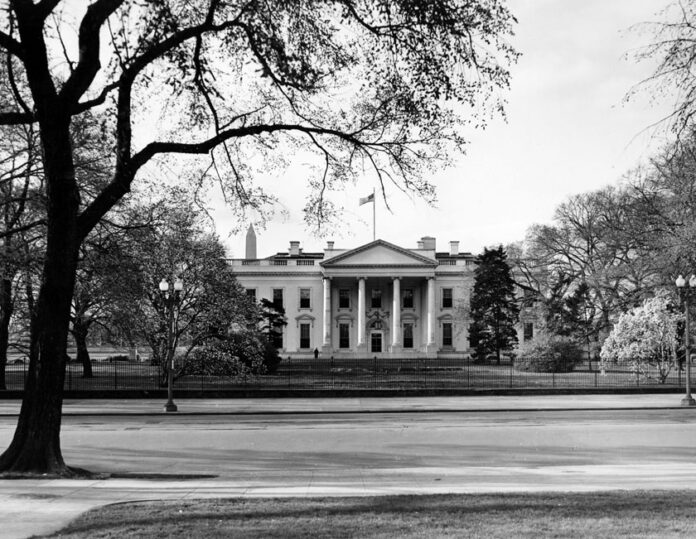Originally published by Philip Wegmann — October 25, 2023
Citing the First Amendment, the White House Tuesday rejected calls to pull the visas of students who express support for Hamas while Republicans rolled their eyes at what they see as suspicious and sudden conversion to free speech absolutism.
This includes Sen. Eric Schmitt, who sued the Biden administration as Missouri attorney general on First Amendment grounds for their policing of social media posts during the pandemic. The idea that President Biden was a “staunch defender” of free speech, he said was “laughable.”
“Biden and his administration have engaged in the largest censorship enterprise in American history,” Schmitt told RealClearPolitics. “Don’t believe for a second this administration has found religion on free speech as Biden continues to battle in court to censor Americans.”
The case in question: Biden v. Missouri.
And as that state’s attorney general, Schmitt argued that the administration had pressured tech companies to delete controversial social media posts concerning the origins of COVID-19, administration pandemic policies, and the Hunter Biden laptop.
The Supreme Court temporarily blocked an order by the 5th U.S. Circuit Court of Appeals in New Orleans last week prohibiting the executive branch from contacting social media companies about potential misinformation online. The lower court previously ruled this summer that the administration had cultivated a vast “federal censorship enterprise” and likely violated the First Amendment.
The current controversy: whether or not First Amendment protections apply to non-citizens who express support for a terrorist organization, such as Hamas. It was Sen. Marco Rubio who first argued that, in this case, those protections do not apply.
In a letter to Secretary of State Antony Blinken earlier this month, the ranking member of the Senate Foreign Relations Committee called on the administration “to revoke the visas of those who have endorsed or espoused Hamas’ terrorist activity.”
Across the country, demonstrators protested the Israeli military response to the Oct. 7 Hamas terror attack in Israel that killed 1,400 people, including 39 American citizens. While most condemned violence and called for a cease-fire, other demonstrators went a step further.
The Harvard Palestine Solidarity Groups, for instance, released a statement signed by about 30 student organizations that read, “We, the undersigned student organizations, hold the Israeli regime entirely responsible for all unfolding violence.”
Protestors gathered on the national mall last week with signs that read “From the river to the sea, Palestine will be free.” The slogan calls for a Palestinian state from the Jordan River to the Mediterranean Sea, a development that Jewish leaders say would necessarily mean erasing Israel itself and its people. Elsewhere in Minneapolis over the weekend, protestors shut down a city street and two men were spotted hoisting the green and white flag of Hamas.
The White House quickly drew a red line after the terror attack and denounced any effort to equate the Hamas attack with previous actions taken by Israel. “Our condemnation belongs squarely with terrorists who have brutally murdered, raped, and kidnapped hundreds of Israelis,” Biden spokeswoman Karine Jean-Pierre told RCP. “There can be no equivocation about that. There are not two sides here.”
When asked about the proposal advanced by Rubio, however, the president’s national security spokesman, John Kirby, pointed to protections in the U.S. Constitution.
“I would just tell you, you don’t have to agree with every sentiment expressed in a free country like this to stand by the First Amendment and the idea of peaceful protest,” Kirby told RCP. “I’ll leave it at that.”
Rubio found that answer wanting. “This is a ridiculous excuse,” he replied, telling RCP that there is “no First Amendment right to a visa and all we ask is they apply current law.” According to the senator, “The First Amendment has nothing to do with it.”
He was also quick to allege a double standard. “This is the same administration that worked with social media companies to censor American citizens,” Rubio continued. “They provide First Amendment protections more rigorously to foreigners than Americans.”
The proposal has quickly become GOP orthodoxy, especially among candidates now seeking the Republican presidential nomination.
“As president, if you’re on a student visa and you’re a foreigner and you’re out there celebrating terrorism, I’m canceling your visa and I’m sending you home,” said Florida Gov. Ron DeSantis at a campaign stop last week, expressing a sentiment that former President Trump would later echo.
South Carolina Sen. Tim Scott expressed a similar idea, arguing that “foreign national students on visas who are protesting against our ally Israel should be sent back to their country.”
While Republicans argue that the issue is simple, and Rubio cites existing federal law that bars admission into the U.S. an alien who “endorses or espouses terrorist activity or supports a terrorist organization,” separating pro-Palestine from pro-Hamas rhetoric could be challenging and would almost certainly invite legal challenges.
The Supreme Court “has at least twice said that the First Amendment applies to non-citizens in the country,” according to Michael Kagan, a law professor at the University of Nevada, Las Vegas, and director of the UNLV Immigration Clinic.
Writing in a 2015 California Law Review article, Kagan added, however, that “no Supreme Court case has squarely reached the question of whether free speech rights apply to immigrants that entered unlawfully.” As it applies specifically to foreign students, the scholar continued, the federal government had “a lot more discretion” given that a student visa “could be canceled,” noting also that the Supreme Court has previously found that the government’s “vast plenary power to control entrance into the United States overcame any First Amendment objections.”
As academics debate that thorny constitutional question and Republicans allege hypocrisy on the part of an administration that was willing to flag certain speech as disinformation, public opinion, particularly among young people, is evolving on the larger issue.
A recent Harvard-Harris poll found that 51% of 18- to 24-year-olds believe the Hamas terror attacks “can be justified by the grievance of Palestinians.”
sourced –
This article was originally published by RealClearPolitics and made available via RealClearWire.










The Trans Movement’s New Trotskyist
Originally published by Roy Mathews — October 06, 2022
The Stonewall Riots of 1969 saw New York City police officers lose control of their attempt to shut down the mafia-run Stonewall Inn, inadvertently ushering in an era of gay actvisim. Today, those early leaders of the gay rights movement might be better off leaving street activism to the next generation, but Fred Sargeant must have missed that memo.
Last month, Sergeant was assaulted at a pride march by radical trans activists and sent to the ER. His thought crime was simply holding a sign that read, “gay, not queer,” and criticizing the march’s sponsor for claiming that the word gay, “erased the breadth of sexual orientations and gender identities within the LGBTQ+ umbrella.” Sargeant’s “outdated” views got him on the receiving end of the trans mob’s wrath.
Sargeant must think he’s living in a 21st-century “Twilight Zone.” This time it’s not police batons raining down on him, but the fists and lattes of queer activists and men presenting as females. Sergeant’s beating exposes a fatal flaw within the current transgender movement: It’s focus is on forcing Americans to accept their range of identities or face consequences. Such extortion will only alienate Americans.
From normalization to forcing acknowledgement
The goal of gay rights activism has evolved over time from normalizing same-sex attraction, to emphasizing a person’s right to love whom they choose, to championing an individual’s right to build their own reality and force others to conform to it.
This emphatic shift must befuddle Sargeant. After all, the credit for normalizing gay relationships was not won by openly flaunting sexuality in public, but by showing how much in common gay Americans had with straight Americans. Folks that were gay worked 9-5 jobs, had dinner with their families, and had hobbies like everyone else.
These personal relationships formed the foundational support for gay acceptance. After all, every single person can relate to feelings of attraction. Now, the argument for trans acceptance deals with the internal and ethereal feelings of someone’s personal consciousness.
The need to appeal to commonalities between people has been replaced with an identitarian movement fundamentally opposed to any sort of commonality at all. One need look no further than the plethora of different so-called “neo-pronouns,” as individuals try to out-do one another in their quest to distinguish themselves from their peers.
Old activists like Fred Sargeant are akin to Leon Trotsky, the communist revolutionary who was cast out of his own party, exiled, and eventually killed on order from Joseph Stalin, whose own ideology had superseded the “elitism” and “factionalism” of Trotskyism.
Casting out Sargent akin to Sovietesque revisionism
Sargent is enduring a similar fate. His assaulter’s ageist remarks indicate they believe transgenderism is an improvement upon the gay rights movement which Sargeant merely founded.
It’s not the first time the transgender movement’s enmity against gay-rights supporters has smacked of a Soviet coup. J.K. Rowling’s cancellation by the transgender movement evokes the memory of Sergei Kirov, an Old Bolshevik and personal friend of Stalin whose assassination kicked off the first “Great Purge.” Kirov’s status as a pre-revolutionary Bolshevik granted him huge sway in the Communist Party, similarly to Rowling’s prestige as an author gave her untold influence on my younger generation.
The rush to remove the old guard of activists like Fred Sargeant and Rowling from the trans crowd would make Stalinist’s red with envy.
The revisionism and bastardization of the gay rights movement is plain in its ever-changing acronym: LGBTQIA2s+, as of this writing. Old activists like Fred Sargeant took great personal risk to accomplish what they did. For him to be beaten, cast aside, and denied that he ever played a role in the gay rights movement smacks of Sovietesque revisionism.
Forcing acceptance onto vast swathes of people is exactly what the USSR attempted to do with its history of 1956 Hungary. Calling a popular uprising a fascist counter-revolution only served to help topple Soviet Hungary as photos and memories of the revolution helped keep history alive and expose the authorities as frauds.
The memory of the 1956 Revolution’s leader Imre Nagy was so powerful that when Soviet Hungarian authorities reburied him in 1989, the Hungarian people rose up in defiance of their government. The same will happen to the transgender movement if the excommunication and suppression of people like Fred Sargeant continues.
sourced –
This article was originally published by RealClearPolitics and made available via RealClearWire.